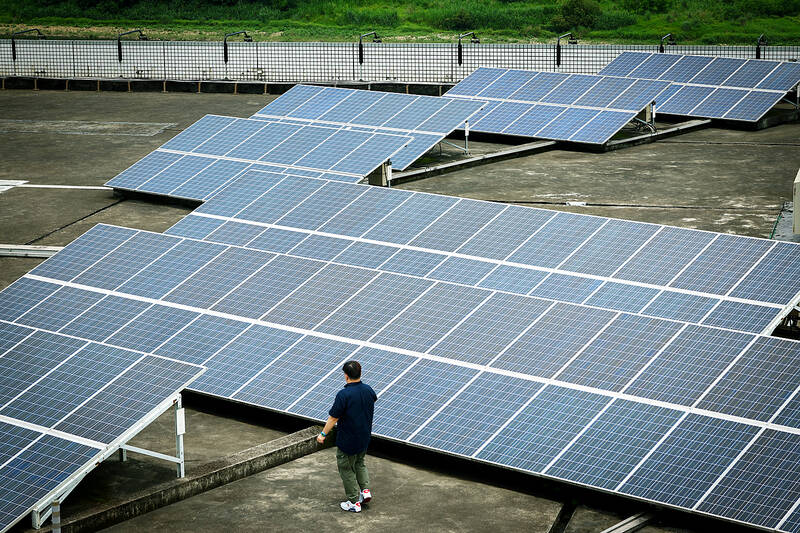The Democratic Progressive Party (DPP) yesterday hit back at accusations by the Chinese Nationalist Party (KMT) that a former DPP government official was profiting from sustainable energy projects, saying that at least eight former KMT government officials or senior KMT officials also sit on the boards of green energy companies.
These eight KMT members’ involvement in green energy businesses is estimated at more than NT$500 million (US$15.7 million), including earning a combined more than NT$100 million each year serving as board members, DPP spokesman Chang Chih-hao (張志豪) said.
“KMT officials are disparaging green energy while profiting from green energy,” he said. “In the past few weeks, we have seen KMT and TPP [Taiwan People’s Party] members attacking Taiwan’s green energy development, while ignoring why the government is pushing the transition from fossil fuels to sustainable sources.”

Photo: CNA
Accusing the KMT and its presidential candidate, New Taipei City Mayor Hou You-yi (侯友宜), of double standards, Chang said they have been criticizing the DPP’s sustainable energy policy, “while many former KMT government officials sit on the boards of green energy companies, and some have even secured large government projects for wind farms and solar energy.”
Green energy has been a hot topic in recent weeks, with the KMT and the TPP attacking former DPP legislator and vice labor minister Lai Chin-lin (賴勁麟) for serving as chairman of the board of J&V Energy Technology (雲豹能源), accusing him of conflict of interest and using his “political connections” to help the company win tenders from Taiwan Power Co (Taipower, 台電), for energy storage and solar farm projects.
Lai on Monday resigned as J&V chairman.
Chang yesterday named eight former KMT government officials or senior party officials who are involved in green energy projects, including former vice premier Woody Duh (杜紫軍), currently convener of the Hou campaign’s national policy team, who serves on the board of Shinfox Energy (森崴能源) and is an independent director at major electrical cable and energy storage producer Walsin Lihwa Corp (華新麗華). KMT Deputy Chairman Andrew Hsia (夏立言) also sits on the board of Walsin Lihwa.
KMT Central Standing Committee member Chen Tsung-hsing (陳宗興) is the chairman of Hung Hua Construction Co (宏華營造), as well as cofounder of Dong Fang Offshore Co (東方風能) and Taiwan Marine Heavy Industry (台灣海洋重工), which have secured several offshore wind farm projects for Taipower, Chang said.
Also on the list is Shih Yen-hsiang (施顏祥), a former minister of economic affairs who is an independent director for CTCI Corp (中鼎工程), Taiwan’s largest engineering project firm focusing on power plants, oil and petrochemical refineries.
Chang also cited Lin Sheng-chung (林聖忠), a former deputy minister of economic affairs who is an independent director for Swancor Holding Co (上緯投控), a chemical producer that is also involved in green energy and offshore wind farms.
Hwang Jung-chiou (黃重球), a former Taipower chairman, is an independent director for Century Wind Power Co (世紀離岸風電), which has undertaken several offshore wind farm projects in central Taiwan’s coastal areas, Chang said.
Meanwhile, former National Development Council minister Lin Chu-chia (林祖嘉), currently head of the KMT’s Mainland Affairs Department, is an independent director for Aimcore Technology Co (安可光電), a producer of display panels, optic devices and solar panels.
Tsai Hsun-hsiung (蔡勳雄), former head of the Council for Economic Planning and Development, is a board director at Co-Tech Development Corp (金居開發), a metal chemical products and solar panel producer, Chang said.

An essay competition jointly organized by a local writing society and a publisher affiliated with the Chinese Communist Party (CCP) might have contravened the Act Governing Relations Between the People of the Taiwan Area and the Mainland Area (臺灣地區與大陸地區人民關係條例), the Mainland Affairs Council (MAC) said on Thursday. “In this case, the partner organization is clearly an agency under the CCP’s Fujian Provincial Committee,” MAC Deputy Minister and spokesperson Liang Wen-chieh (梁文傑) said at a news briefing in Taipei. “It also involves bringing Taiwanese students to China with all-expenses-paid arrangements to attend award ceremonies and camps,” Liang said. Those two “characteristics” are typically sufficient

A magnitude 5.9 earthquake that struck about 33km off the coast of Hualien City was the "main shock" in a series of quakes in the area, with aftershocks expected over the next three days, the Central Weather Administration (CWA) said yesterday. Prior to the magnitude 5.9 quake shaking most of Taiwan at 6:53pm yesterday, six other earthquakes stronger than a magnitude of 4, starting with a magnitude 5.5 quake at 6:09pm, occurred in the area. CWA Seismological Center Director Wu Chien-fu (吳健富) confirmed that the quakes were all part of the same series and that the magnitude 5.5 temblor was

The Central Weather Administration has issued a heat alert for southeastern Taiwan, warning of temperatures as high as 36°C today, while alerting some coastal areas of strong winds later in the day. Kaohsiung’s Neimen District (內門) and Pingtung County’s Neipu Township (內埔) are under an orange heat alert, which warns of temperatures as high as 36°C for three consecutive days, the CWA said, citing southwest winds. The heat would also extend to Tainan’s Nansi (楠西) and Yujing (玉井) districts, as well as Pingtung’s Gaoshu (高樹), Yanpu (鹽埔) and Majia (瑪家) townships, it said, forecasting highs of up to 36°C in those areas

The brilliant blue waters, thick foliage and bucolic atmosphere on this seemingly idyllic archipelago deep in the Pacific Ocean belie the key role it now plays in a titanic geopolitical struggle. Palau is again on the front line as China, and the US and its allies prepare their forces in an intensifying contest for control over the Asia-Pacific region. The democratic nation of just 17,000 people hosts US-controlled airstrips and soon-to-be-completed radar installations that the US military describes as “critical” to monitoring vast swathes of water and airspace. It is also a key piece of the second island chain, a string of